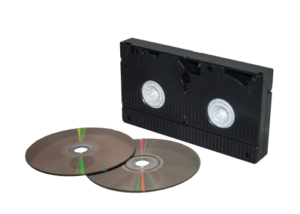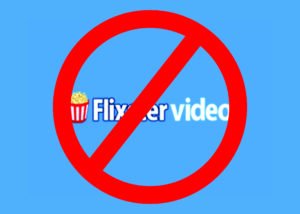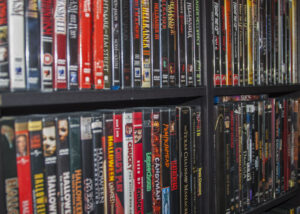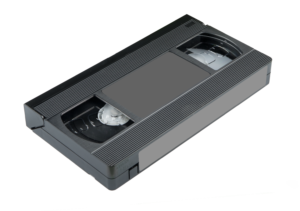The title of this article says it all. Is physical media (currently DVD and Blu-rays) still relevant in 2018? Is it better to buy all your films and TV shows in digital formats and dispose of the discs and cases that clutter your cabinets and bookshelves? What are the benefits of each form and what should we invest more into?
 As a film collector and viewer, I personally own over 1500 movies and TV shows in some physical form and I wouldn’t have it any other way. I enjoy having them on display where I can show them off to visitors of my home or simply view some fantastic artwork on the covers. I sometimes feel a sense of nostalgia as I scan the shelves choosing the movie for that night and remember perusing through my local video rental store as a child (believe it or not it wasn’t a Blockbuster). Some of you are instantly thinking of all the negatives of a large collection of movies like this. “How do you store all of those?”, “You must have spent a fortune on movies”, or “You’re going to feel foolish when DVD becomes defunct and you can’t play your movies” are some things I have heard about my collection. These and a few other concerns play into people dropping physical media and switching over to a completely digital film collection. However, digital media has its own concerns including ownership, exclusivity, and quality.
As a film collector and viewer, I personally own over 1500 movies and TV shows in some physical form and I wouldn’t have it any other way. I enjoy having them on display where I can show them off to visitors of my home or simply view some fantastic artwork on the covers. I sometimes feel a sense of nostalgia as I scan the shelves choosing the movie for that night and remember perusing through my local video rental store as a child (believe it or not it wasn’t a Blockbuster). Some of you are instantly thinking of all the negatives of a large collection of movies like this. “How do you store all of those?”, “You must have spent a fortune on movies”, or “You’re going to feel foolish when DVD becomes defunct and you can’t play your movies” are some things I have heard about my collection. These and a few other concerns play into people dropping physical media and switching over to a completely digital film collection. However, digital media has its own concerns including ownership, exclusivity, and quality.
 When you are purchasing a film from a digital source like Amazon Prime Video, Vudu, or even YouTube, the rules of ownership can be unclear. Amazon alone has pages of terms of use and video usage rules. Depending on the platform you purchase through, you could be subjected to even stronger scrutiny with the use of the product and if you are found to be in transgression of any of those rules, the platform may close your account and in the case of Amazon Prime, have you delete all your downloaded content (it’s in their terms). Don’t believe they can do that? It happened in back in 2009 when Amazon realized it was selling illegal digital copies of a few George Orwell books and deleted the books from people’s Kindles remotely and without their knowledge. Amazon did refund people their money after a backlash of complaints. Also, with Amazon, even though you are able to download your purchased videos for viewing, you can only do so on compatible devices and you are limited to only 2 downloads at a time. In all honesty, with all these rules it feels less like owning and more of a “permanent” rental (which is an oxymoron) or a lease of the content.
When you are purchasing a film from a digital source like Amazon Prime Video, Vudu, or even YouTube, the rules of ownership can be unclear. Amazon alone has pages of terms of use and video usage rules. Depending on the platform you purchase through, you could be subjected to even stronger scrutiny with the use of the product and if you are found to be in transgression of any of those rules, the platform may close your account and in the case of Amazon Prime, have you delete all your downloaded content (it’s in their terms). Don’t believe they can do that? It happened in back in 2009 when Amazon realized it was selling illegal digital copies of a few George Orwell books and deleted the books from people’s Kindles remotely and without their knowledge. Amazon did refund people their money after a backlash of complaints. Also, with Amazon, even though you are able to download your purchased videos for viewing, you can only do so on compatible devices and you are limited to only 2 downloads at a time. In all honesty, with all these rules it feels less like owning and more of a “permanent” rental (which is an oxymoron) or a lease of the content.
 Not only that, but recently digital streaming provider Flixster Video shut down. Because of this, people who had digital content through Flixster Video must now migrate their accounts over to a new provider, Vudu or use another user of the Ultraviolet digital locker. While that is a solution, it puts customers in a strange position. I personally would not like to use Vudu (it is owned by Walmart, a company I prefer not to frequent if I can avoid it), so if that were my only option I would have to choose over using the service or losing the films I spent money on. Thankfully, there are other services I can use as I do own a few digital films myself. But, if Flixster or any other provider used a proprietary software for viewing and the company shuts down (YouTube and Amazon Prime will not be around forever), and no one picks up the pieces where does that leave your library? Gone. On the other hand, if Disney were to go out of business, I still have a DVD of Snow White, it is mine as long as it still functions. It is irrelevant what condition the company who sold it to me is in.
Not only that, but recently digital streaming provider Flixster Video shut down. Because of this, people who had digital content through Flixster Video must now migrate their accounts over to a new provider, Vudu or use another user of the Ultraviolet digital locker. While that is a solution, it puts customers in a strange position. I personally would not like to use Vudu (it is owned by Walmart, a company I prefer not to frequent if I can avoid it), so if that were my only option I would have to choose over using the service or losing the films I spent money on. Thankfully, there are other services I can use as I do own a few digital films myself. But, if Flixster or any other provider used a proprietary software for viewing and the company shuts down (YouTube and Amazon Prime will not be around forever), and no one picks up the pieces where does that leave your library? Gone. On the other hand, if Disney were to go out of business, I still have a DVD of Snow White, it is mine as long as it still functions. It is irrelevant what condition the company who sold it to me is in.
 One thing that is almost an illusion for advocates of digital media over physical is the cost. Surely if you buy a digital film it costs less than if you buy a Blu-ray? There is less to manufacture, transport, or display so the production cost reduction must transfer to the consumer. Well, yes it does to a point, but let us use a recently released film for some comparison. Blade Runner at the time of this article costs $24.99 on Amazon for the Blu-ray + DVD + Digital Copy of the film, but if you want the digital copy only, it costs 14.99 for the HD version on Amazon Prime Video. That sounds like a good deal, but let us see what you are missing. You only get the movie. No special features unless you have a device that supports X-Ray (Amazon’s interactive feature). You only have one format which is digital and locked to your provider. So if you want to bring it over to a friend’s house you have to log them out of their device and log yourself in. Make sure you aren’t at the device cap or else you have to log yourself out of one of your devices first. Then you can watch the movie. If you have the physical set, you not only have 2 formats of physical media to just carry over to a friend’s house and pop in their proper player, but you also get the digital copy! If you are the type of person who likes them, you also get special features that you can’t get with the digital copy. So, let us look at that cost again. For 60% of the price of the physical form that has multiple formats, special features, and a digital copy, you get a digital copy. I personally see a value for dollar issue with this. And, if you suddenly grow tired of the movie and want to get rid of it, you can sell the physical copies (or give it to a friend) and still keep the digital copy online for yourself. Actually, you don’t really have a choice there because the digital copy is non-transferable.
One thing that is almost an illusion for advocates of digital media over physical is the cost. Surely if you buy a digital film it costs less than if you buy a Blu-ray? There is less to manufacture, transport, or display so the production cost reduction must transfer to the consumer. Well, yes it does to a point, but let us use a recently released film for some comparison. Blade Runner at the time of this article costs $24.99 on Amazon for the Blu-ray + DVD + Digital Copy of the film, but if you want the digital copy only, it costs 14.99 for the HD version on Amazon Prime Video. That sounds like a good deal, but let us see what you are missing. You only get the movie. No special features unless you have a device that supports X-Ray (Amazon’s interactive feature). You only have one format which is digital and locked to your provider. So if you want to bring it over to a friend’s house you have to log them out of their device and log yourself in. Make sure you aren’t at the device cap or else you have to log yourself out of one of your devices first. Then you can watch the movie. If you have the physical set, you not only have 2 formats of physical media to just carry over to a friend’s house and pop in their proper player, but you also get the digital copy! If you are the type of person who likes them, you also get special features that you can’t get with the digital copy. So, let us look at that cost again. For 60% of the price of the physical form that has multiple formats, special features, and a digital copy, you get a digital copy. I personally see a value for dollar issue with this. And, if you suddenly grow tired of the movie and want to get rid of it, you can sell the physical copies (or give it to a friend) and still keep the digital copy online for yourself. Actually, you don’t really have a choice there because the digital copy is non-transferable.
 Space is a huge component of the physical versus digital media argument. When it comes down to it, DVDs and Blu-rays take up space in your home; space that could be used for many other things (or not used at all). This is not a problem with digital though. Everything is either stored remotely on servers, or at worst you have multiple movies stored on a device of some kind. Space almost becomes a non-issue with digital media. While there are ways to work with physical media is regards to storage. It will always come up short when compared to digital.
Space is a huge component of the physical versus digital media argument. When it comes down to it, DVDs and Blu-rays take up space in your home; space that could be used for many other things (or not used at all). This is not a problem with digital though. Everything is either stored remotely on servers, or at worst you have multiple movies stored on a device of some kind. Space almost becomes a non-issue with digital media. While there are ways to work with physical media is regards to storage. It will always come up short when compared to digital.
With physical media, you also have to worry about something that this whole article is about. The loss of format. With digital, this becomes nearly impossible. If you buy a movie through Vudu or Amazon or YouTube, it will be playable until it is removed from the service or the service ceases. With physical media, we have seen up to this point that when something new comes out (DVD) the old goes away (VHS). There is a small argument against this. When Blu-ray came out, DVD was supposed to join VHS in the annals of history. This has not happened yet. Currently, we are still seeing two media formats running together and a third is being added in (if you count 4K as a third format). However, all three are appearing to slowly lose ground to digital and it seems like an inevitability that the disc format will be replaced sometime.
 In conjunction with this is the age of physical media. VHS’s that exist in the world are starting to degrade just from age. Disc mediums have a bit longer lifespan, but even that has a clock that is ticking down and recently people are seeing their collection getting a hit from disc rot. With digital, again this is nonexistent. As long as the provider exists, so does your copy of the film.
In conjunction with this is the age of physical media. VHS’s that exist in the world are starting to degrade just from age. Disc mediums have a bit longer lifespan, but even that has a clock that is ticking down and recently people are seeing their collection getting a hit from disc rot. With digital, again this is nonexistent. As long as the provider exists, so does your copy of the film.
I will always be a proponent of physical media. When my internet provider has a problem and I lose internet, I still can watch many of my favorite shows and movies with my DVDs and Blu-rays. If I want to cancel my Hulu, Netflix, or Amazon accounts to save money, I can still pop in a movie and enjoy it. For me owning a physical copy of something gives me a feeling of security and freedom. I am not tied to a specific company through my digital library, and I don’t have to worry about forgetting a password or breaking terms of service and losing all of my library. Yes, it is easier to flip through a screen showing all your movies and select which you like, but I wouldn’t trade that for seeing the artwork on a cover and holding a disc and booklet in my hand.
As each year passes the thought of the demise of physical media is brought up. It is a foregone conclusion that DVDs and Blu-rays will be a thing of the past. Whether they are replaced with a new format or if digital will become the only way to view has not yet been fully decided. I personally like to think that a new physical format will come into play that will last through the next generation of movie watchers. Only time will tell though. Until then, I am going to sit on my couch and admire my growing collection of movies.
Leave a Reply